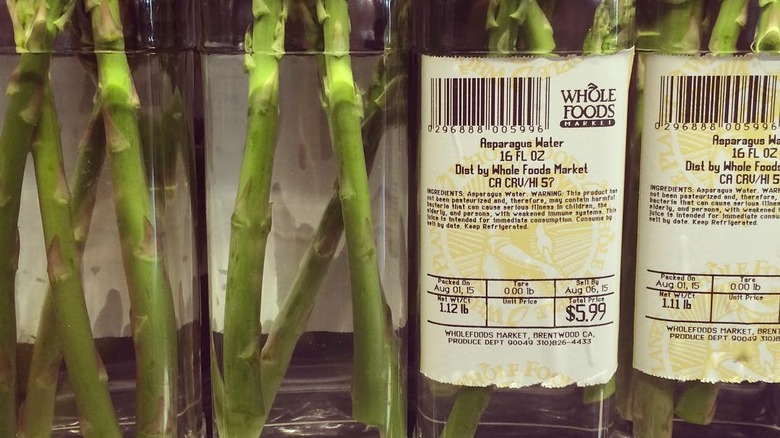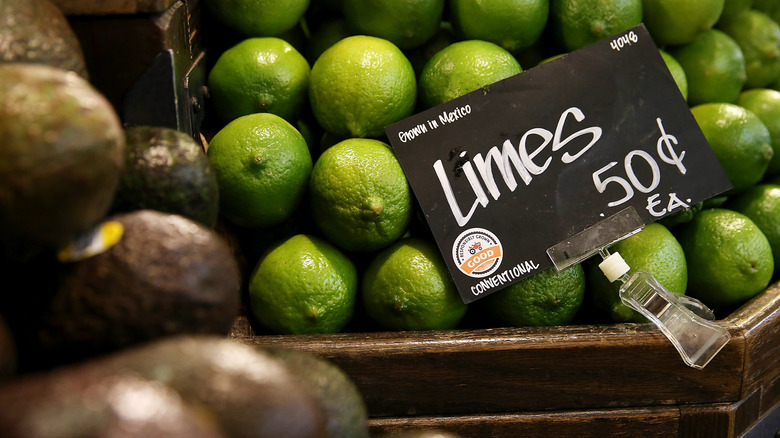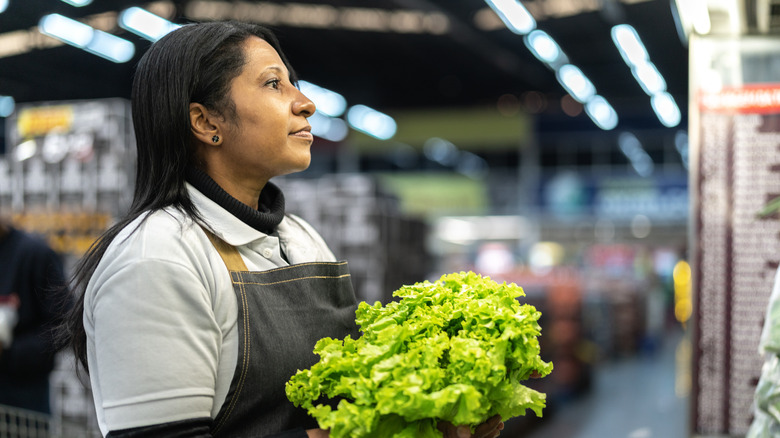The Biggest Controversies In Whole Foods History
What once began as a proudly hippie-dippie natural foods store run by just 19 staffers has since ballooned into the $575 billion profit-making machine known as Whole Foods. However, you don't rise to the top without ruffling a few feathers along the way.
Austin, Texas, born Whole Foods Market boasts 500 locations and counting in the U.S., Canada, and the UK, featuring all sorts of natural, seasonal, and local specialties — including roughly 41,000 organic items (That includes 365 Organic peanut butter cocoa balls cereal). Despite the non-GMO glow around the cult-favorite supermarket, there's more than meets the discerning shopper's eye when it comes to shocking company policies and cringe-worthy management practices.
From phoned-in bottled asparagus water to tortured rabbit meat, price gouging, and bribing employees to lose weight — it all comes down to the biometrics, bioengineering, and bad business that put Whole Foods in a hole after these big time blunders.
The $6 asparagus water rip-off
While we recommend storing asparagus in water to keep it fresh, plunking a few spears into bottled water, and charging customers $5.99 for "asparagus water," was a Whole Foods concept that went over like, well, boring vegetables in water.
Although $6 water might not faze grocery shoppers of the mid-2020s, back in 2015, the sticker shock was real when an average bottle of water cost just $1.50 by the following year. The clap-back was immediate. As Los Angeles Magazine editor Marielle Wakim posted on Instagram, "Somewhere in L.A., Whole Foods executives are laughing at all of us."
Even worse at the time, Whole Foods was also selling entire bunches of fresh asparagus for $5, highlighting the option to hack this water at home on the cheap. While the asparagus was said to impart some amount of nutrition to the water, others took the idea and ran with it. One user joked on X, "You know #wholefoods is struggling when they're selling #asparaguswater for $6." Whole Foods asparagus water's brief reign of terror was quickly quashed.
The secret sugar in the yogurt scam
Back in 2014, Whole Foods customers claimed house brand 365 plain Greek yogurt was dishing up more than just a dose of probiotics. A class-action lawsuit cited a Consumer Reports discovery that showed the yogurt packed a sugar content far exceeding the digits on the label.
Whole Foods 365 Fat-Free Plain Greek Yogurt was packaged in a tub that noted 2 grams of sugar for every 8-ounce serving. However, Consumer Reports did its own testing after noticing that the sugar content was much lower than other brands' average of 5 to 10 grams of sugar for the same-sized serving. Instead, testing found that Whole Foods' version contained 11 grams of sugar per cup.
A spokesperson for Whole Foods claimed that the findings didn't match its own third-party testing. When the higher sugar content was proven to be accurate, California shopper Stephen Kubick brought a class-action lawsuit against Whole Foods Market for manipulating him into buying a higher-priced product on account of the lower sugar content, alleging $5 million in damages. Amidst 11 consumer lawsuits, the yogurt was taken off the market with Whole Foods earning a summary judgment against the goat farm that failed to update the grocer on testing that showed higher sugar content in its milk.
The outrageous overcharge bust
Whole Foods may never shake its "whole paycheck" reputation no matter how affordable the groceries seem to be for the average shopper. In 2015, however, specialty store pricing reached a new level when the New York City Department of Consumer Affairs (DCA) unearthed a "systematic overcharging for pre-packaged foods."
Findings revealed more than 80 packages with incorrect weights — with 89% of pre-packaged items exceeding the legal margin of error for misclassified weights. Department commissioner Julie Menin told CNN, "Our inspectors tell me this is the worst case of mislabeling they have seen in their careers." Overcharges were found on pecan panko, berries, and coconut shrimp — landing anywhere between 80 cents to almost $15 in excessive cost. Whole Foods denied the allegations and slammed the DCA for tipping off the media. Just a year earlier, in 2014, Whole Foods had paid out almost $800,000 in fines for jacked-up price violations in California. It also eventually paid $500,000 in a settlement as part of the lawsuit brought by New York City in 2015.
The 'Responsibly Grown' farmer revolt
Whole Foods bills itself as "the first and only certified organic national grocery store." However, it seems that the company brought the hammer down on certified organic farmers, undermining its own mission.
Reportedly, Whole Foods had ranked produce grown with fertilizers and pesticides higher than organic-certified produce as part of a grading system it launched in 2014. The grades, as described by the "Responsibly Grown" website, featured "good," "better," or "best" labels for fresh flowers, fruits, and veggies in an effort to reduce neurotoxin-grown items in Whole Foods stores. However, the new program required farmers — many already shelling out to attain the organic certification on their farms — to pay thousands of dollars in tracking systems and paperwork, along with answering a detailed questionnaire that rarely resulted in a "best" classification. That, along with nonorganic produce getting higher marks and receiving "responsibly grown" designations, ticked off experienced certified organic farmers.
Some argued that the labeling system was a way to shoehorn cheaper conventional produce into shoppers' carts. Cornucopia Institute founder Mark Kastel told NPR, "Why would you pay more for a certified organic product, when you can get the 'best' for a couple of dollars a pound cheaper?"
The scorecard system nightmare
Along with grading produce, Whole Foods launched a compliance scoring system for its human component, too. Just prior to Amazon's acquisition of Whole Foods in 2017, an aggressive scorecard stocking system called Order-To-Shelf (OTS) was implemented to reduce waste, with employees feeling the pain.
The system required meticulous tracking of everything in the store, but longtime Whole Foods employees claimed the benefit wasn't worth the stress. Staffers reported layoffs and firings across the board, with one Georgia worker telling Business Insider, "We've lost team leaders, store team leaders, executive coordinators, and even a regional vice president. Many of them have left because they consider OTS to be absurd."
Managerial walk-throughs required employees to earn above an 89.9% to pass and might include pop-quiz style recitation of brand mission, core goals, sales rundowns, and listing the week's best-sellers. A West Coast supervisor explained to Business Insider, "I wake up in the middle of the night from nightmares about maps and inventory." The OTS system also resulted in product shortages and empty shelves for shoppers.
The heartless employee benefits package
There's a lot going on behind the scenes as you wonder whether to add manuka honey to your cart. Following a series of consolidation efforts and layoffs that hit as Amazon took control of Whole Foods, grocery employees leveraged reports of Amazon warehouse worker exploitation to position themselves for a unionized fight for their benefits.
In 2018, an email attempting to unionize employees of Whole Foods' 490 stores declared a desired minimum wage, increased retirement benefits, lower cost health insurance, and better maternity leave. "The success of Amazon and [Whole Foods Market] should not come at the cost of exploiting our dedication and threatening our economic stability," the email stated. Five years prior, founder and then-CEO John Mackey had claimed, "We're not so much anti-union as beyond unions." As of 2024, Whole Foods workers have not established union status. With rumors of "union busting" and other sketchy corporate practices floating around the internet, it seems employees may just have to accept whatever benefits the company offers.
The arsenic-laced bottled water recall
The U.S. Food and Drug Administration (FDA) allows a certain amount of arsenic to be present in drinking water. Despite the regulations, the Center for Environmental Health (CEH) found arsenic levels in bottled water at Whole Foods that tested much higher than the FDA's idea of a healthy max amount.
Naturally-occuring arsenic gets FDA approval up to 10 micrograms (10 parts-per-billion) per liter of bottled water. In 2016, Whole Foods reportedly shattered those metrics when its Starkey Spring Water brand tested higher than the FDA limit at 11.7 parts-per-billion. The bottles were pulled from shelves in the first of two recalls, the second of which was triggered after the same brand tested at 12 parts-per-billion for arsenic.
Even in 2020, the Starkey brand was still making headlines for testing at roughly 3 times the amount of arsenic of other bottled water brands, while adhering to FDA standards. A spokesperson for Whole Foods told Consumer Reports that the company strives "to provide customers with safe, high-quality, and refreshing spring water."
The prison labor pipeline
In 2015, goat cheese and tilapia sold at Whole Foods became the catalyst for a protest against the chain alleging that prison-labor was used during the production of these items. While the inmate rehabilitation program may have developed job skills that led to lower recidivism, Whole Foods shoppers weren't vibing with prisoners making pennies on a production line for expensive cheese.
To source goat milk and fish, Whole Foods purveyors Haystack Mountain Goat Dairy and Quixotic Farming had partnered with a Colorado Department of Corrections program designed to train and pay prisoners to care for fish and goats living on prison farms. However, End Mass Encarceration Houston founder Michael Allen took issue with the setup, telling NPR, "People are incarcerated and then forced to work for pennies on the dollar — compare that to what the products are sold for." After Allen alerted Whole Foods CEO John Mackey to the problem, Whole Foods pulled the cheese from its shelves.
That being said, prisoners are still busy milking goats and feeding fish even if Whole Foods doesn't sell the final product. That's because the program appears to be a winner with inmates. As former prisoner Mike Engler told NPR, "Part of the deal, when you're in prison, you have to work anyway ... You're never going to leave the facility, and you're scrubbing walls with a toothbrush, basically. These guys actually get out, they have a purpose, and they make more than 60 cents a day."
The toxic packaging fiasco
It might be hard to pronounce polyfluoroalkyl, but now it's even tougher to accidentally eat it. Thanks to the results of independent studies, Whole Foods ditched takeout packaging that contained the toxin in 2018.
Studies from the groups Safer Chemicals Healthy Families and Toxic-Free Future triggered the elimination of polyfluoroalkyl substances (PFAS) in Whole Foods takeout packaging. According to the FDA, PFAS are chemicals that stand up to heat, water, oil, and grease. While certain amounts are FDA-approved for food packaging, studies have shown that repeated exposure to the toxin can result in the development of cancer. Packaging at Whole Foods tested positive for fluorine which signified the use of PFAS. A Whole Foods spokesperson told CNBC at the time, "Whole Foods Market introduced compostable containers to reduce our environmental footprint, but given new concerns about the possible presence of PFAS, we have removed all prepared foods and bakery packaging."
The rabbit meat boycott
Cottontail bunnies may be the cutest backyard animal, but customers didn't see anything adorable about the Whole Foods pilot program that landed rabbit meat in stores. Tastes aside, critics of the plan organized protests alleging that no one was looking out for the welfare of these animals.
As select Whole Foods stores, including some in California and Washington, D.C., solidified plans to sell rabbit meat, animal rights activists jumped into action calling for the company to stop selling alleged pets as food. The outcry was effective, with one Virginia Beach store halting rabbit meat sales by July 2014.
Earlier that May, Whole Foods released a statement that read, "For many years, lots of customers have requested that we carry rabbit ... As most rabbit production is grim, we set out to develop our own set of animal welfare standards, which began a rigorous four-year process to address the welfare issues in rabbit production." However, a Change.org petition with more than 55,000 signatures showed people weren't buying it, as protestors cited rabbit meat standards published by Rabbit.org that were not regulated by the USDA Humane Methods of Slaughter Act. By 2015, rabbit meat sales at the store officially ended, leaving just fruit snacks and cookies in the shape of bunnies on the shelves.
The employee biometrics violation
In the era of the Amazon One payment option to scan your palm at the Whole Foods checkout, it might seem quaint to think of an employee fingerprint time-clock as being a violation of workers' privacy. However, the secret storing of those metrics is exactly what prompted a class-action lawsuit against the grocery giant in 2019.
At the time, Whole Foods had implemented biometric technology to simplify timecard creation by scanning employees' fingerprints at the start and end of their shifts. But when one Illinois Whole Foods employee claimed she was never informed that her fingerprints would be collected by a third-party agency — which violated the state's Biometric Information Privacy Act (BIPA) requiring consent — a lawsuit from the employee followed. Since information like fingerprints can't be reset like a password could, a breach in system security could threaten users' identities. The suit sought $1,000 to $5,000 in damages per incident on behalf of the estimated 75 employees of the Illinois store.
Whole Foods was hit with another class-action lawsuit for violating BIPA, over allegations that employees were using headsets that illegally collected their voiceprints. A preliminary settlement of almost $300,000 was awarded to the plaintiffs in 2023.
The CEO's noninclusive healthcare stance
After serving as Whole Foods co-founder and CEO since the store's inception in 1980, John Mackey stepped down from his post in 2022. Over his decades-long tenure, he made headlines thanks to his position on the healthcare system — as well as customers' waistlines. The most shocking revelation came after The Wall Street Journal dug into the Whole Foods consumer-driven healthcare plan which suggested that "its 30,000 or so workers to feel a bit of the pain every time a doctor sends out a bill."
Slamming the Affordable Care Act, Mackey penned an op-ed for The Wall Street Journal in 2009 that read, "Unfortunately many of our health-care problems are self-inflicted: two-thirds of Americans are now overweight and one-third are obese." With his sights aimed squarely at Whole Foods employees and customers, he described how the company would pull a one-eighty regarding foodie culture to refocus on whole food for healthy living. "If you work for the company you get a 20% discount card. We're going to create incentives for our team members to get healthier."
With a company-wide healthcare plan that had some employees skipping vacation days to save for doctor visits, plus a CEO who seemingly hoped to bribe workers to lose weight, a Whole Foods boycott quickly followed.
The GMO sweet corn slip
Shoppers were saying more than 'aw shucks' about fresh corn when they discovered conventional sweet corn hiding in plain sight at Whole Foods in 2023. While the perception may be that the vibe is all-organic, Whole Foods officially stocks its shelves with conventional as well as organic products. Still, despite being displayed with labels that stated "bioengineered" — the preferred term for GMO according to the USDA — customers were outraged at this Monsanto-developed veggie appearing alongside actual organic produce. While the bioengineered term may be familiar to some, consumer-advocate group Toxin Free USA still launched a drive to stop the sale of this sweet corn, noting the common use of insecticides and herbicides which can cause harm to the planet as well as human development.
One former global grocery manager for Whole Foods placed the blame on Amazon for its cost-cutting influence over the previously more organic-minded Whole Foods brand. "Putting toxic, environmentally damaging GMO corn on a pedestal is a slap in the face of Whole Foods' customers," claimed Toxin Free USA communications director Luan Van Le, adding, "Greenwashing is the only word that can describe the company's actions. We expect better from the company."
The allegations of racial insensitivity
Unfortunately, Whole Foods has made plenty of headlines around racial insensitivity. In 2018, a partnership with the restaurant Yellow Fever blew up social media when Whole Foods posted about the new in-store eatery on Twitter. For its part, Yellow Fever's South Korean owner Kelly Kim called the moniker "tongue-in-cheek."
Later that same year, a non-English-speaking immigrant was reportedly kicked out of a Whole Foods store near Miami for eating too many samples. Management and local law enforcement engaged with Alexis Zaldivar, who alleged that racist euphemisms were used. "I felt like a cockroach," he told CBS News. "For it to happen in front of all those people, it made me feel bad, very bad."
Following alleged discriminatory firings and reports involving of the racial profiling of customers, Whole Foods manager Jaleel McFadden claimed in 2019 that a discriminatory promotion policy prevented him from rising through the ranks over his 22 years with the company. For its part, Whole Foods said in a statement, "Whole Foods Market does not tolerate discrimination of any kind. We value and celebrate diversity in a culture of respect and empowerment."














